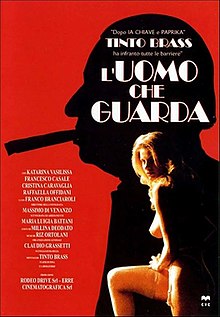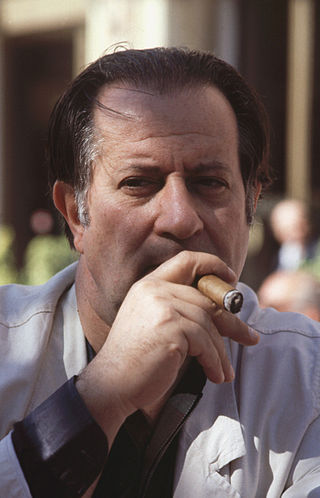
Giovanni "Tinto" Brass is an Italian film director and screenwriter. In the 1960s and 1970s, he directed many critically acclaimed avant-garde films of various genres. Today, he is mainly known for his later work in the erotic genre, with films such as Caligula, Così fan tutte, Paprika, Monella and Trasgredire.

Alberto Granado Jiménez was an Argentine–Cuban biochemist, doctor, writer, and scientist. He was also the youthful friend and traveling companion of Che Guevara during their 1952 motorcycle tour in Latin America. Granado later founded the University of Santiago de Cuba School of Medicine. He authored the memoir Traveling with Che Guevara: The Making of a Revolutionary, which served as a reference for the 2004 film The Motorcycle Diaries, in which he was played by Rodrigo de la Serna. An elderly Alberto Granado makes a short appearance at the end of the film.

Alberto Moravia was an Italian novelist and journalist. His novels explored matters of modern sexuality, social alienation and existentialism. Moravia is best known for his debut novel Gli indifferenti and for the anti-fascist novel Il Conformista, the basis for the film The Conformist (1970) directed by Bernardo Bertolucci. Other novels of his adapted for the cinema are Agostino, filmed with the same title by Mauro Bolognini in 1962; Il disprezzo, filmed by Jean-Luc Godard as Le Mépris ; La Noia (Boredom), filmed with that title by Damiano Damiani in 1963 and released in the US as The Empty Canvas in 1964 and La ciociara, filmed by Vittorio De Sica as Two Women (1960). Cédric Kahn's L'Ennui (1998) is another version of La Noia.

The Man Who Copied is a 2003 Brazilian crime comedy-drama film written and directed by Jorge Furtado, set in Porto Alegre, Rio Grande do Sul, Brazil.

"Upon the Dull Earth" is a fantasy short story by American writer Philip K. Dick, first published in November 1954 in Beyond Fantasy Fiction.
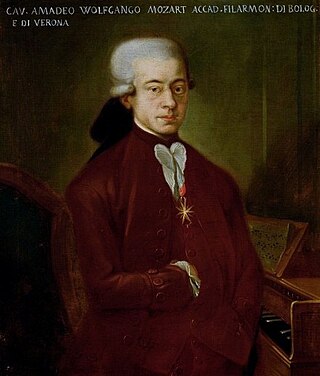
Ascanio in Alba, K. 111, is a pastoral opera in two parts by Wolfgang Amadeus Mozart to an Italian libretto by Giuseppe Parini. It was commissioned by the Empress Maria Theresa for the wedding of her son, Archduke Ferdinand Karl, to Maria Beatrice d'Este on 15 October 1771.

Fausta is a melodramma, or opera seria, in two acts by Gaetano Donizetti. The Italian libretto was partly written by Domenico Gilardoni, who died while doing so: the remainder was written by Donizetti. The literary source of the opera's libretto is Crispo, a tragedy improvised by Tommaso Sgricci on 3 November 1827.

Km. 0 is a 2000 film Spanish directed by Yolanda García Serrano and Juan Luis Iborra. The plot concerns about several intertwining stories of mistaken identity and coincidental meetings that take place near the Kilometre Zero marker in the Puerta del Sol in Madrid.

Muchacha italiana viene a casarse is a 1971 Mexican telenovela by Televisa produced by Ernesto Alonso and directed by Alfredo Saldaña, starring Angélica María and Ricardo Blume. Writing credits belong to Delia González Marquez, Fernanda Villeli (adaptation), Marissa Garrido (adaptation), Miguel Sabido (adaptation) and Carlos Lozano Dana (adaptation)
"Who's Your Daddy?" is the twenty-third episode of the second season of House and the forty-fifth episode overall. The title is in reference to two separate stories in the episode.

Alberto Malesani is an Italian football manager and former player. As a manager, he is mostly remembered for his successful spell with Parma during the late 1990s, where he won the Coppa Italia, the UEFA Cup, and the Supercoppa Italiana.

Los ricos también lloran is a popular telenovela produced in Mexico in 1979, starring Verónica Castro, Rogelio Guerra and Rocío Banquells. Castro also sang the theme Aprendí a Llorar, a song written by Lolita de la Colina. The telenovela was produced by Valentín Pimstein and Carlos Romero, it was directed by Rafael Banquells. The story was written by Inés Rodena and adapted by Valeria Philips.

Tra(sgre)dire is a 2000 sex comedy directed by Tinto Brass, with Yuliya Mayarchuk in the lead role. Certain parallelisms are drawn between Nerosubianco (1969), another Tinto Brass film set in London.

Beyond the Clouds is a 1995 Italian-French-German romance film directed by Michelangelo Antonioni, with contributions by Wim Wenders, and starring John Malkovich, Sophie Marceau, Vincent Perez, Irène Jacob, and Jean Reno. The film consists of four stories of romantic love and illusion told from the perspective of a wandering film director. In the first story, two beautiful young lovers are unable to consummate their passion because the young man desires impossible perfection. In the second story, the director makes love to a young woman who reveals that she murdered her father. In the third story, a man makes an effort to appease both his wife and his mistress. In the fourth story, a young man is infatuated with a girl who is about to enter a convent. This was the final feature-length film by Antonioni before his death in 2007.

Fallo! is a 2003 Italian film co-written and directed by Tinto Brass. The film is known in English as Do It! and Private. The title is pun on the term "Fallo!" meaning in Italian both "Do It" and "Phallus" and the movie itself consists of a series of 6 independent vignettes.

Salon Kitty is a 1976 erotic-war-drama film directed by Tinto Brass. The film was coproduced by Italy, France and West Germany. It is based on the novel of the same name by Peter Norden, covering the real life events of the Salon Kitty operation, under which the Sicherheitsdienst took over an expensive brothel in Berlin, had the place wire tapped, and replaced all the prostitutes with trained spies, in order to gather information on various members of the Nazi party and foreign dignitaries.
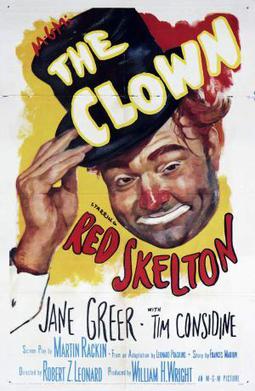
The Clown is a 1953 American drama film starring Red Skelton with Jane Greer and Tim Considine, and directed by Robert Z. Leonard. The story is derived from The Champ (1931).

Snack Bar Budapest is a 1988 Italian neo-noir comedy film written and directed by Tinto Brass and starring Giancarlo Giannini. It is based on the novel with the same title by Marco Lodoli and Silvia Bre.

Monella is a 1998 Italian comedy-erotic film directed by Tinto Brass.
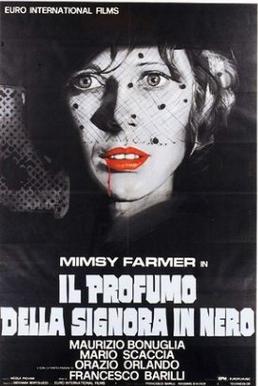
The Perfume of the Lady in Black is a 1974 giallo-horror film directed by Francesco Barilli. The film had nothing to do with the similarly-titled novel by Gaston Leroux.
